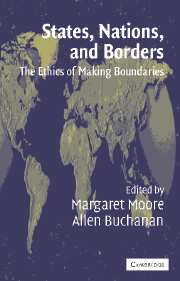Book contents
- Frontmatter
- Contents
- About the Contributors
- Acknowledgments
- 1 Introduction: The Making and Unmaking of Boundaries
- THE JEWISH TRADITION
- THE CONFUCIAN TRADITION
- THE CHRISTIAN TRADITION
- THE NATURAL LAW TRADITION
- THE ISLAMIC TRADITION
- 10 Political Boundaries and Moral Communities: Islamic Perspectives
- 11 The Unbounded Law of God and Territorial Boundaries
- THE LIBERAL TRADITION
- THE INTERNATIONAL LAW TRADITION
- CONCLUSION
- Index
10 - Political Boundaries and Moral Communities: Islamic Perspectives
Published online by Cambridge University Press: 24 November 2009
- Frontmatter
- Contents
- About the Contributors
- Acknowledgments
- 1 Introduction: The Making and Unmaking of Boundaries
- THE JEWISH TRADITION
- THE CONFUCIAN TRADITION
- THE CHRISTIAN TRADITION
- THE NATURAL LAW TRADITION
- THE ISLAMIC TRADITION
- 10 Political Boundaries and Moral Communities: Islamic Perspectives
- 11 The Unbounded Law of God and Territorial Boundaries
- THE LIBERAL TRADITION
- THE INTERNATIONAL LAW TRADITION
- CONCLUSION
- Index
Summary
From its formative years, the Islamic tradition has grappled with the tension between the existential reality of particularistic group identities and loyalties and the normative vision of a universal Muslim community; between the attachments and claims of peoples to particular places and the recognition that the world we inhabit is the common legacy of all humankind. The life of the prophet Muhammad contains ample evidence that he both recognized and used the power of tribal affinities while simultaneously working to establish the transcendent identity of membership in the community of Muslim believers, the umma. According to one hadith, the Prophet declared: “He is not of us who proclaims the cause of tribal partisanship ('asabiyya); and he is not of us who fights in the cause of tribal partisanship; and he is not of us who dies in the cause of tribal partisanship.” Seven centuries later, Ibn Khaldun argued that what the Prophet castigated was not group loyalties ('asabiyya) per se, only the negative consequences stemming from blind chauvinism. Group feelings are natural to human beings and, when properly motivated and channelled, are necessary to the Muslims' fulfillment of God's purpose. In 1933, Rashid Rida responded in much the same way when asked if twentieth-century Muslim nationalism was merely another manifestation of 'asabiyya. When nationalism is the patriotic expression of a people's desire to rid themselves of foreign oppression, he argued, it is quite different from the narrow tribal ethos condemned by Islam.
- Type
- Chapter
- Information
- States, Nations and BordersThe Ethics of Making Boundaries, pp. 181 - 213Publisher: Cambridge University PressPrint publication year: 2003
- 1
- Cited by

